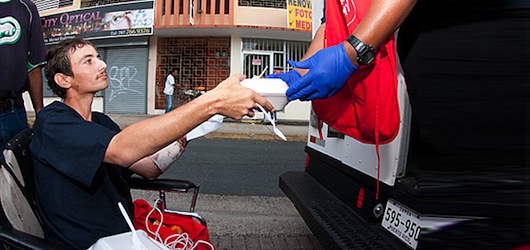
Another way in which Christianity is changing is the number of churches that are getting involved in their local communities, offering help and counselling services to those who need them and finding ways to make their community a better and more caring place.
We can learn from three different churches in three different continents.
Out with the old, in with the ‘new’ (?)
Fifty years when I was becoming acquainted with the christian faith, few Protestant churches were doing “good works” in the community. Of course there was always the Salvation Army, but they were somehow different, hardly a “real church”.
But evangelical christians were very wary of the “social gospel”, that might somehow compromise the “true gospel” of salvation by faith.
For some, it hasn’t changed a lot
These days, many denominations support social support activities such as aged care, family counselling and support and drug and alcohol support. But it still seems often to be the poor relation in some churches – evangelism is still “the gospel” and caring for others isn’t.
At the same time, churches are mostly either still losing numbers or just breaking even. For example, the Sydney Diocese of the Anglican Church, one of the largest Protestant church groupings in Sydney, embarked on a mission 10 years ago to increase the number of evangelical christians in the city. A decade later, and it is reported that numbers have barely kept pace with population, and the numbers of newcomers and 15-29 years olds has declined.
I think the two observations may be connected.
Three churches doing it differently
Georges River Lifecare, Sydney, Australia
Georges River Community Church made the decision quite a few years ago to transition from a suburban Baptist church meeting in a small conventional church building, to a church which interacted and focused on helping members of the surrounding community. It took them several years of meeting in a High School to get there, but now they own an enormous old factory complex and have begun their community work.
Georges River Lifecare has been running for several years, and offers a range of support programs for children, teens, adults and families. Their facilities include a full cafe/coffee shop, counselling rooms, kids’ play spaces and offices, and are in use right through the week. Hundreds of people from well outside the church’s normal contact visit the premises, interact with staff, counsellors and volunteers, and some go on to other involvement too.
Interesting to me is the fact that Lifecare’s programs are not generally “faith-based” (and they make it clear when they are), but they are offered by a praying community that sees caring for hurting people as part of their DNA. Some more traditional evangelical churches only offer outreach and “care” programs if there is some explicit “gospel” content, but Lifecare apparently believes that when people experience the care, they will want more – and by then they have built friendships with members of the church.
The church is growing.
LifeChurch, Bradford, UK
This is another church that seems to have transformed itself in the last decade. It appears to be a young and vibrant, and it sponsors a Love Bradford program that offers dozens of community building programs.
Interestingly, UK Muslims also offer a Lifecare program, although its programs are more focused on emergency situations overseas.
Dream Center, Los Angeles, USA
The Dream Center began as a fairly standard “church plant”, but soon the pastor knew the location in downtown LA demanded a different kind of ministry. Purchasing a large (about 8-9 storeys) decommissioned old Catholic hospital the nuns were willing to sell to them for a quarter of the price a film studio was willing to pay, the Dream Center set up a huge array of social support ministries to the homeless, the unemployed, gang members, and the hungry.
I’m not sure I feel comfortable about the enormous Angelus Temple where the church now meets, but their positive impact in their neighbourhood cannot be doubted.
Things that stand out
All three churches appear to be strong on encouragement. They seem to take a gradual approach, first encouraging people to feel part of the caring community, valued, and with hope for the future. Teaching on faith and forgiveness generally comes later when the newcomers feel secure enough to receive it.
This is in contrast with the sin-based evangelism of most evangelicalism, which may be effective for people with over-confidence in their own status with God, but seems to only discourage people with low self esteem from returning. Traditional evangelicals may feel these churches are not “preaching the full gospel”, but it seems to me to be closer to how Jesus ministered – tough sayings for the rich and religious, but acceptance and forgiveness for the down-trodden. It also allows the Holy Spirit to guide when people are ready for different parts of the christian message.
If you’re smart you’ll learn your lessons well
I believe these churches have much to teach the rest of us. We don’t have to agree with everything they say and do to learn that God indeed blesses those who care for “the least of these”.
Photo: Salvation Army